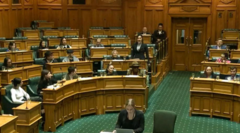**The blocking of Ekrem Imamoglu's social media account intensifies concerns about political repression in Turkey, as protests emerge demanding his release.**
**Turkey Blocks Social Media Access of Jailed Opposition Leader Ekrem Imamoglu**

**Turkey Blocks Social Media Access of Jailed Opposition Leader Ekrem Imamoglu**
**Authorities restrict communications for Imamoglu, sparking protests and allegations of political suppression.**
Access to the social media account of Ekrem Imamoglu, the jailed opposition mayor of Istanbul and a prominent rival to President Recep Tayyip Erdogan, has been blocked by Turkish authorities. This unexpected move means that Imamoglu can no longer communicate directly with his 9.7 million followers on X, although his account remains accessible internationally. His social media presence has proven crucial for maintaining connections with supporters and advocating for his cause from prison, where he has been held since March on allegations of corruption, which he denies.
Following the blocking of his account, a significant protest took place in Istanbul, drawing tens of thousands of attendees demanding Imamoglu's release. Commentators suggest that this action reflects a broader attempt by the government to suppress dissent and silence the opposition ahead of the next presidential election scheduled for 2028. Members of Imamoglu's Republican People's Party (CHP) have labeled the move a continuation of an alleged coup attempt following his arrest in March, emphasizing their belief that the government fears losing its grip on power.
A message from Imamoglu's account indicated that the legal demand for the blockage was responsible for this restriction, though it can still be accessed in Turkey through virtual private networks (VPNs). In the days leading up to the prohibition, Imamoglu had used his account to address the nation, urging citizens to voice their grievances against his treatment and the government's growing authoritarianism.
His imprisonment has been accompanied by a wave of arrests across Istanbul, further spotlighting the deteriorating human rights environment in Turkey. Imamoglu's plight has galvanised support, prompting many social media users to adopt his image as a display of solidarity. Observers, including political analysts from respected institutions, have expressed their views that this incident reveals an alarming trend in the Turkish political landscape where dissent is increasingly stifled.
In what has become a central point of tension, the charges against Imamoglu and the backdrop of mass arrests have drawn condemnation from human rights advocates, who argue that the judiciary in Turkey is being weaponized for political purposes. The government maintains that its courts operate independently, despite widespread skepticism. Protests have continued throughout Istanbul, revealing a resilient spirit among citizens disillusioned with government actions, although participation has fluctuated in size since the initial surge following Imamoglu's arrest.






















